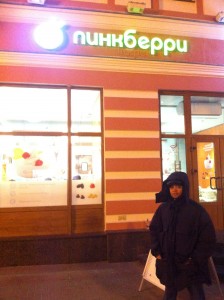It took seven months of living in our Moscow apartment to finally figure out how the cable worked (it came pre-installed). And once we did, we figured out that 1) watching Adventure Time in Russian is even trippier than watching it in English, and 2) watching dubbed episodes of Storage Wars is a great way to practice recognizing numbers. We’ve also been exposed more and more to Russian television, though we like the advertising more than the actual shows sometimes.
On March 9, Channel One marked the birthday of the deceased Yuri Gagarin with a rather lavishly produced and thoroughly engrossing biopic with visuals that were stunning enough to make up for the almost total (for us) incomprehensibility of what any of the actors playing Soviet engineers were saying on screen. A number of things about this film have stuck with me. First, the fact that most of Russia was basically in the nineteenth century at the time when Gagarin became the first man in space in 1961. When he falls back to earth (and a big part of that fall, by the way, was done in the manner of skydiving–no protective shuttle pod encasing him once he’d cleared the upper layers of the atmosphere), he falls into the middle of a field, where a farmer is leading his horse under a traditional harness. It’s a region not unlike the place where Gagarin grew up in the village of Klushino. One of the final images of the film is the remains of the spacecraft lying in a similar spot surrounded by a military barrier, the Space Age aesthetic of the Vostok a stark contrast to the timeless agrarian idyll surrounding it.
And then there were the shots of students pouring out of Moscow State University–students for whom the unparalleled suffering of WWII was still a living memory–and heading toward Red Square, where the film cuts between shots of the actors and actual newsreel footage. And as this sense of celebration and idealism builds to a climax, with young people shouting “В космосе!” the thought that kept going through my head was, “And on the other side of the world, America collectively shits its pants.” It’s not saying anything particularly new to observe that what for the Soviet Union was a moment of triumph not just for the USSR but for humanity was a moment of both terror an humiliation for the US. Because the Soviet Union got there first, and if the Soviet Union could put a man in space, it meant they could likely put a nuclear missile in Los Angeles or New York.
A while back, I posted pictures of a visit to the All-Russia Exhibition Center (ВДНХ) and the Monument to the Conquerors of Space that sits outside of it:
One of my Facebook friends asked me to remind him of the name of the guy who scared the crap out of his parents’ generation, and he was talking about Yuri Gagarin. And here’s the thing, in the film, Yuri Gagarin looked like this:
And the real Gagarin looked like this:
He was freaking adorable. In the US, Yuri Gagarin would be played by a young Tom Hanks (there were a number of parallels between this film and Apollo 13). And while the end of his life is an utter tragedy, what he accomplished was without question heroic. And what the Soviet Union did in putting him in space was both a centerpiece of nationalist propaganda and a triumph for humanity. That the narrative in the US tended to lean toward framing it as an act of military aggression is an artifact of the zero-sum stakes of the Cold War and mid-century ambivalence about technology’s erosion of boundaries that traditionally kept us at least feeling secure (a theme which is also subtly explored in this film).
As commentators increasingly point (irresponsibly, I would argue) toward the beginnings of a New Cold War, the stakes have once again become zero-sum, and the conversation is once again tainted by a pervasive sense of paranoia and a tendency to treat as naked, calculated aggression acts that are probably in reality far less rational, far more motivated by immediate local politics, and far more self-defeating than they are portrayed to be.
I need to back up for a second. People keep asking me questions about how I’ve experienced the Ukraine crisis in Moscow, and some family members have asked why I haven’t blogged about it. And the reasons why are as follows:
- Like pretty much everyone in the States, I’ve been following the Ukraine crisis via television and the internet. It’s impact on my day to day life has been negligible aside from the daily fluctuations of the ruble and occasional emails from the Embassy reminding Americans to stay away from public demonstrations.
- My opinions change almost daily.
- The American expat in Russia finds herself in a tough spot, ideologically speaking. Because on the one hand, you want to defend Russia against the more sensationalistic and divisive parts of the American media while at the same time not appearing to be a Putin apologist.
It’s that last one, naturally, that is the thorniest. Because to have a nuanced opinion on what’s going on means having to resist a lot of false equivalencies: comparisons to what is going on now and Hitler’s Anschluss are not helpful, but neither are comparisons to America’s incursion in Iraq (on the one hand, we didn’t annex Iraq–on the other, the Russian army has yet to fire a shot). And while the spin you see in American media is depressing, it is not the same thing as what the Kremlin-backed Russia Today is doing.
But if there is one equivalency that can at least be roughly sketched it’s that for all the very important ways in which they are different, Russia and the US love to frame themselves as heroes on the historic stage. For a good swath of the population here, the annexation of Crimea is not an act of aggression, it is an act of rescue. And yes, the words “greeted as liberators” have crossed my mind.
But even if I’m avowedly skeptical about that rhetoric, I’m also skeptical about any framing of the issue that positions the US as hero, particularly when it involves double standards and overt hypocrisy. While I most certainly prefer American-style democracy to whatever we’ve got going on over here, what the zero-sum game of the Cold Wars, old and new, enables is a narrative of American righteousness that stokes a similarly problematic nationalistic fervor and precludes any kind of honest self-reflection about the nature of American or Western privilege.
Here’s an example. Back during the Sochi Olympics, this image came across my Tumblr dashboard:
It was framed as an act of unparalleled courage. Said Scott Wooledge on Twitter, “Tourists attempting what Tilda Swinton did in #Russia are subject to 15 days in jail. #Courage.” On Tumblr, it was accompanied with the message, “Tilda Swinton risked her freedom to stand up for LGBT rights in Russia.”
But here is the thing, Tilda Swinton was almost certainly at no risk when she did this. Why? Because she is Tilda Swinton. And this was the middle of the Sochi Olympics. And Moscow officials are almost certainly not stupid enough to arrest an international movie star–who brought her own photographer with her–at the precise moment when Russia was trying to make a splash on the international stage. Yes, there is a certain kind of bravery to what Swinton did here, but whatever danger she was in was not the same as what the actual activists here–who get little to no notice from Western media unless they are two very specific former members of Pussy Riot–face on a daily basis.
The LGBT-rights situation in Russia, like the Ukraine crisis, has often been covered by Westerners in ways that are disgustingly self-serving, opportunistic, and ignorant. The conversation about the Swinton photo, I would argue, isn’t really about LGBT rights in Russia. It’s about the heroism of one Western (Scottish) actress. Note also that the above-quoted tweet says nothing about what actual Russians face for similar acts but what tourists in Russia face. LGBT Russians are nowhere in that image or the conversation around it. It’s an opportunity, rather, the celebrate how Westerners are both more free and more courageous.
Likewise, those demanding that the US intervene militarily in Ukraine seem less concerned with actual Ukrainians than bolstering an image of American strength that will somehow bring Russia to heel, as if the past twenty years of foreign policy have been all about breaking the resolve of Russia rather than integrating it into a productive international dialogue. Some would argue that that has in fact been the case.
For all of the talk about anti-American or anti-Western sentiment in Russia, I’ve experienced none of it so far. I don’t see Americans with cameras about their necks being taken aside in the metro and asked to show their papers. I do see that happening to people who look like they are from the North Caucasus. The Western expat–particularly the white one–enjoys privilege here but is not particularly special. Which is why I am troubled by any attempt by Westerners to make this “about them.” Like the attempt to put the first man in space, it kind of sort of is, but in a much bigger sense, it really isn’t. Russians, based on what I’ve seen, don’t spend a ton of time really thinking about Americans. Like most people, they spend most of the time thinking about themselves.























